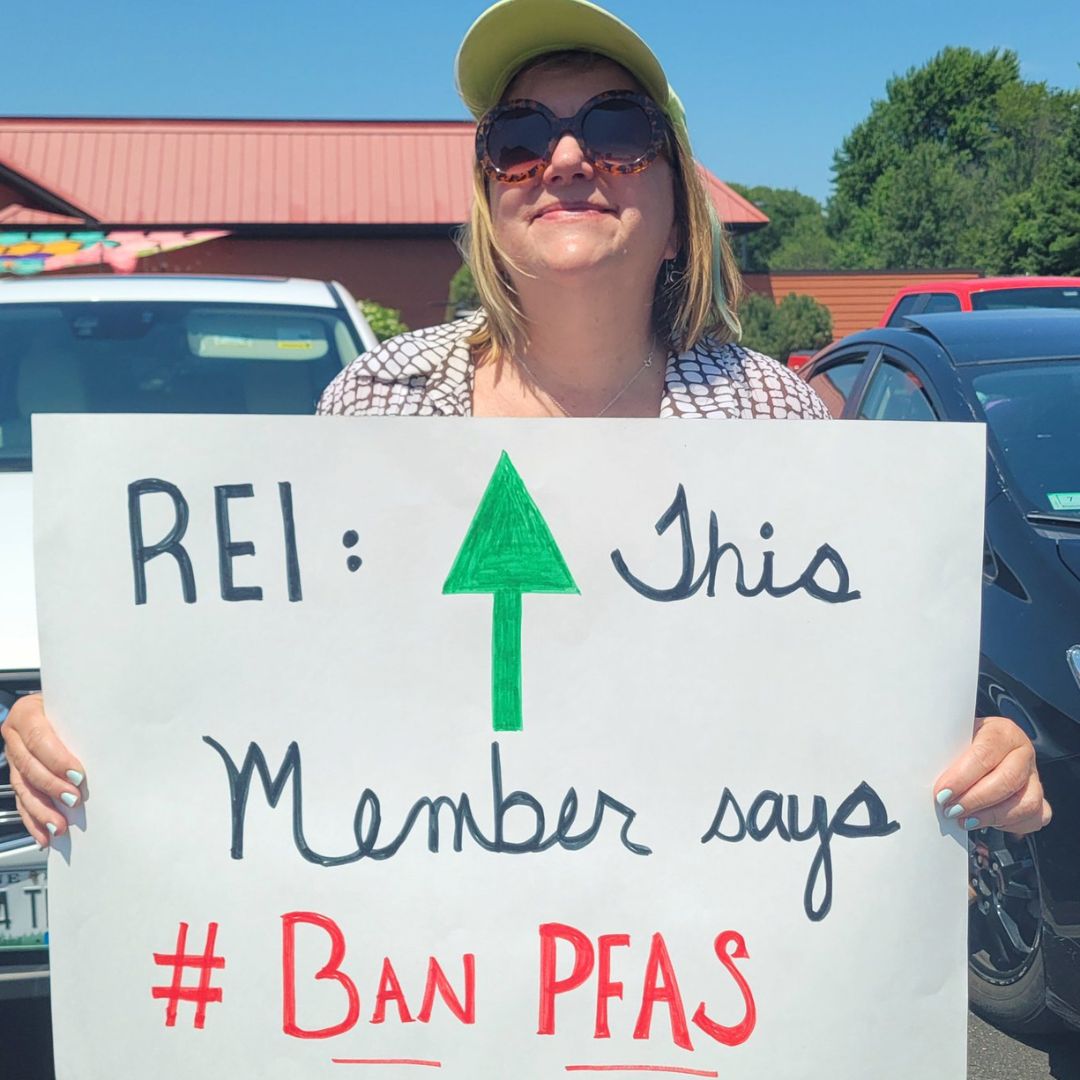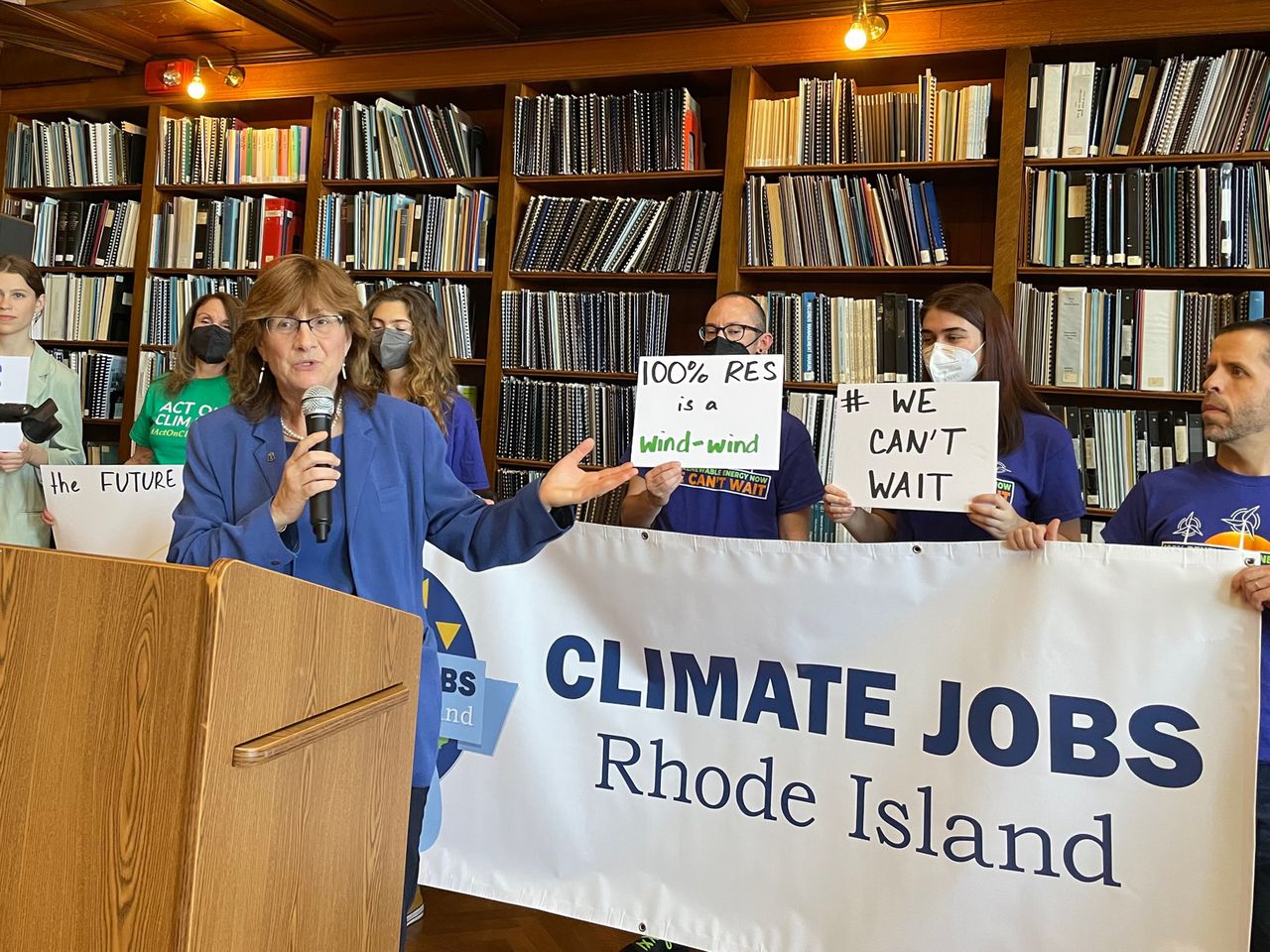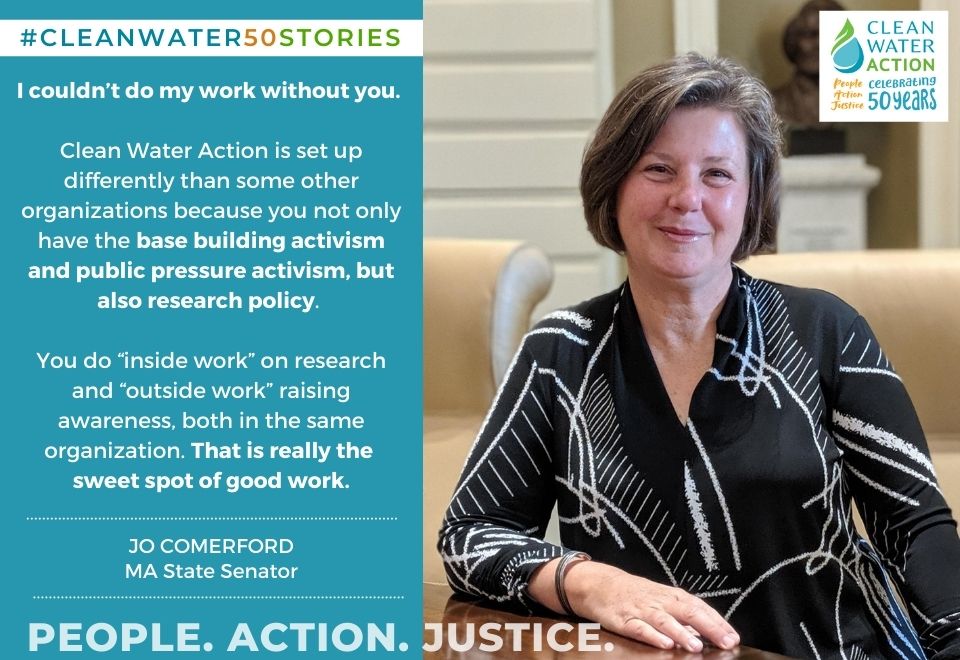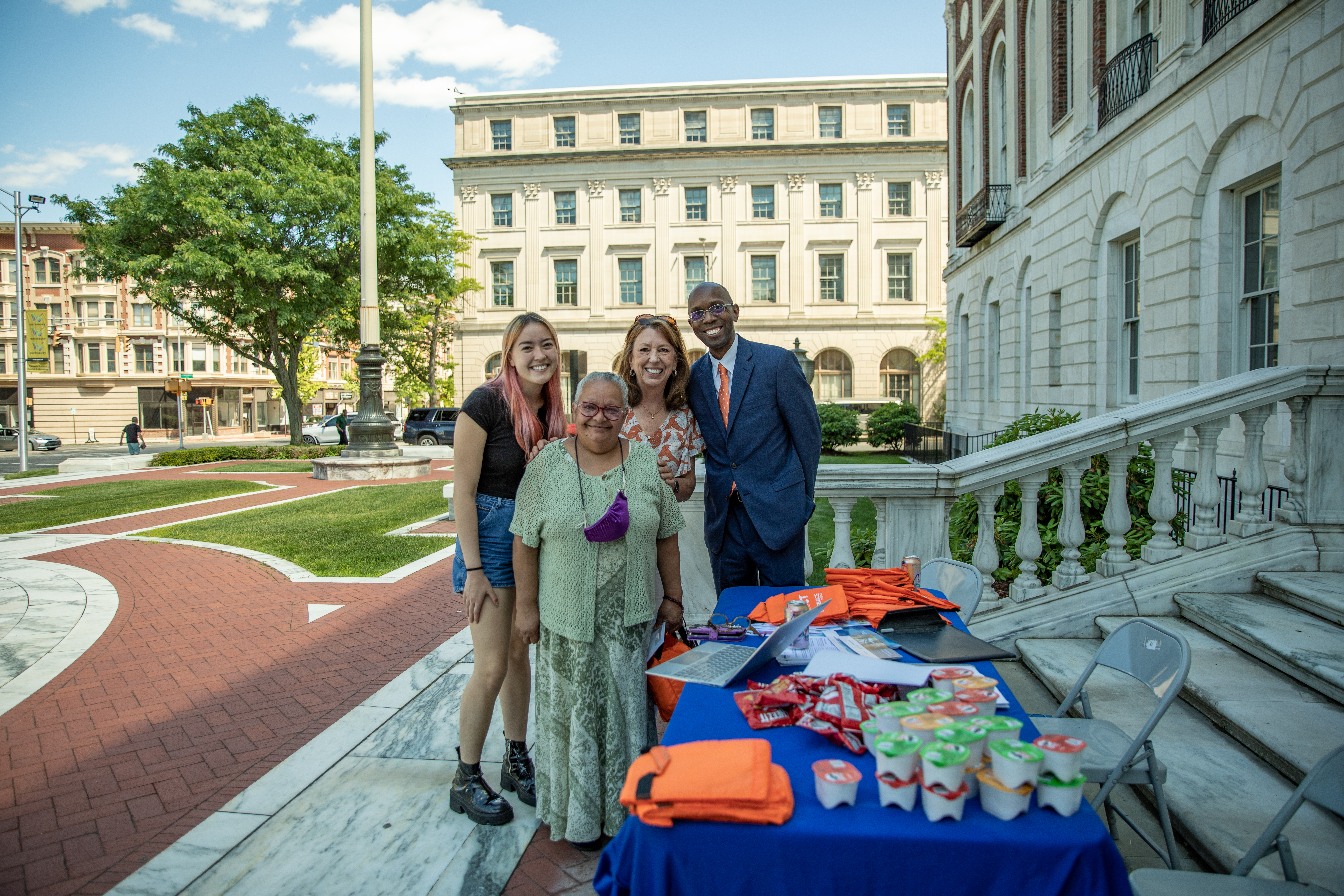In This Issue
- Our REI Campaign Is Taking the Fight Against PFAS to Retailers
- Rhode Island: Big Environmental Victories in the 2022 Legislative Session
- Rhode Island: What is EPR?
- Massachusetts: Legislative Roundup
- Massachusetts: Clean Water 50 Stories - MA State Senator Jo Comerford
- Election Day is November 8th
- Connecticut: Waterbury Home Energy Action Campaign Launches
- Connecticut Celebrates Clean Water Action’s 50th Anniversary
- Check out these blog posts by summer canvassers and interns!
- Download a PDF of this issue
Our REI Campaign Is Taking the Fight Against PFAS to Retailers

Photo: Clean Water Action’s Cindy Luppi shows her support for outdoor gear without toxic PFAS outside of an REI store.
Does your fall rain jacket have a toxic secret? Unfortunately, a lot of outdoor gear is made with PFAS, or per- and polyfluoroalkyl substances, a class of human-made chemicals that are incredibly persistent in the environment and also highly toxic. PFAS can be used to make an item water-resistant, but they have been linked to cancers, reproductive problems, weakened immune systems, and other health problems.
The life cycle of outdoor products containing PFAS pollutes people and the environment at every stage, not just while a consumer is using them. The factories that manufacture these products pollute nearby waterways, and when a consumer disposes of them, they end up in a landfill or an incinerator where they can continue to contaminate nearby communities. Often, these facilities are located in low-income neighborhoods and communities of color. Our outdoor gear shouldn’t be contributing to environmental injustice!
Clean Water Action is part of a coalition effort with Toxic-Free Future to tell the outdoor apparel retailer REI to stop selling products containing toxic PFAS in their stores. Our field canvassers have been collecting postcards to REI from concerned families across New England. This is part of our wider campaign to protect our waterways and New England families from this toxic “forever chemical.”
Tell REI: This Fall, We Want Peak Foliage, NOT PFAS.
Some outdoor apparel companies, like Patagonia, are moving away from PFAS due to the harm they cause to humans and the environment. REI is one of the largest retailers of outdoor gear, and they have a stated commitment to protecting the environment, but they still don’t have a plan to ban PFAS. We need them to lead by example by banning PFAS
from the products sold in REI stores. Thousands of REI shoppers and co-op members, as well as Clean Water Action members across the nation, have already submitted comments and letters to the CEO of REI. TAKE ACTION! Send a letter to REI CEO Eric Artz.
Rhode Island: Big Environmental Victories in the 2022 Legislative Session

Photo: Rhode Island Clean Water Action’s State Director Jed Thorp (right) joined State Representative Deb Ruggiero and the Climate Jobs RI Coalition to celebrate Rhode Island’s new 100% renewable electricity standard.
Ready for some good news? The 2022 Rhode Island General Assembly wrapped up, and we are happy to report that several of Clean Water Action’s priority bills crossed the finish line! This is the direct result of the tireless efforts of our members and coalition partners. Thank you to everyone who wrote letters and emails, sent tweets, made phone calls, and showed up at the State House to fight with us.
First, two of our high priority bills to tackle toxic PFAS chemicals passed in the final days of the session. H7438/S2044 bans the use of PFAS in food packaging, and S2298/H7233 sets statewide limits on PFAS in drinking water for the first time. Both bills will begin to protect Rhode Islanders from these toxic substances and will ensure that we don’t become a dumping ground for PFAS-laden food packaging that other states have banned. These are great first steps as we push for a more comprehensive PFAS ban next year!
We also had two victories on the plastic waste front! After years of hard work, the statewide ban on single-use plastic bags finally passed the General Assembly. This has been a long time priority of Clean Water Action because our state needs to get serious about reducing our consumption and disposal of plastics. We also worked with virtually every environmental group in the state to successfully oppose the “advanced recycling” bill, a scam to allow plastics-burning facilities to be fast tracked in our state without proper oversight. The solution to plastic waste is to create less of it which is why we will be fighting for Extended Producer Responsibility (EPR) legislation and a bottle deposit program next year.
This session also saw Rhode Island take the lead on clean energy with the passage of our state’s ambitious commitment to achieving 100% renewable energy by 2033. Clean Water Action is part of the newly formed “Climate Jobs RI” coalition — a partnership between environmental and labor organizations — that worked together to get this done.
Finally, we are proud to be a part of the “Let RI Vote” coalition which worked together to get the “Let RI Vote Act” over the finish line. This bill expands access to voting by mail to ensure that everyone can cast a ballot while still keeping strong election protections in place. When people vote, the environment wins!
People power makes positive change. Thank you Clean Water Action members!
Rhode Island: What is EPR?
Single-use plastics are piling up nationwide. That’s why Rhode Island Clean Water Action supports Extended Producer Responsibility (EPR) legislation. EPR programs hold plastics manufacturers responsible for the entire lifecycle of the waste they produce rather than forcing taxpayers to foot the bill for plastics disposal. This can come in the form of fees paid by producers to fund reuse and recycling infrastructure and can also include mandated reductions in packaging and/or mandated increased recyclability of packaging to reduce the amount of plastic waste being produced.
Massachusetts: Legislative Roundup

Photo: Together at last. The entire Clean Water Action Massachusetts staff (pictured, from left to right: Elizabeth Saunders, Laura Spark, Cindy Luppi (in rear), Maureo Fernandez y Mora, Paulina Casasola, Bethany Dickerson) were finally reunited in Northampton in August.
The formal Massachusetts 2021-22 legislative session came to a dramatic end with a marathon session. Legislators worked through the night to finalize the climate bill and sent H.5060: An Act driving clean energy and offshore wind to the governor’s desk in the nick of time. While there is still much more to accomplish, this is a huge victory.
The Climate Bill, H.5060, is a huge step forward for offshore wind in Massachusetts. It creates a Massachusetts Offshore Wind Industry Investment Trust Fund, gives preference to offshore wind bids from companies that invest in local manufacturing, and provides employment opportunities for underrepresented populations. The bill also includes provisions that require reporting of building emissions and supports whole building retrofits for low and moderate income households, which will reduce emissions while also reducing energy and water bills for working families.
Other good news from the legislature was the allocation of funds for the remediation of PFAS contamination and for a whole building energy efficiency retrofit pilot in Gateway Cities.
Other bills made progress but did not make it over the finish line yet:
- Legislation to prevent polluting energy facilities from being constructed in environmental justice communities didn’t make it out of committee, but the bill stimulated a much needed conversation in the State House. EJ communities are already overburdened by such facilities across the Commonwealth.
- An air quality bill would have addressed the high asthma burden that occurs disproportionately in communities of color by expanding outdoor air monitoring for the most common and dangerous pollutants in pollution hotspots, setting ambitious air quality targets, requiring air filtration in facilities such as child care facilities, schools, and hospitals, and updating the state sanitary code to improve mold enforcement. The air quality bill received a favorable report from the Public Health Committee.
- Four bills to get toxic PFAS out of consumer products and a bill to require manufacturers to disclose toxic chemicals that are added to children’s products were reported favorably out of committee and are well-positioned to pass in the next session.
- A bill to protect public land from development passed the House and the Senate and is still in a conference committee. We are joining partners in pressing the committee to finalize the bill in an informal session.
We will continue to work with our partners on the ground to fight for all of these policies! Thank YOU for your messages to legislators and for your support that laid the groundwork for this progress and for future victories.
Massachusetts: Clean Water 50 Stories - MA State Senator Jo Comerford

In honor of Clean Water Action’s 50th birthday, we are lifting up voices and stories in the Clean Water movement through #CleanWater50Stories. Meet MA State Senator Jo Comerford, a true environmental advocate leading the way to a clean, green, healthy future for us all. Senator Comerford has played important roles in the state legislature and has worked with Clean Water Action to prevent PFAS contamination in Massachusetts.
What’s your connection to Clean Water?
When I was an organizer back in the late 1990’s, I first got to see the work of Clean Water Action up close. We were working on a coal burning power plants campaign, which Clean Water Action was leading. We closed the Mount Tom dirty coal plant, and we were able to close it in large part because of Clean Water Action.
I’ve also appreciated, over the years, having a chance to get to talk to the younger, newer organizers working with Clean Water Action and really appreciate the way Clean Water is raising up the next generation of organizers. Doing that door-to-door grassroots education work is so critical.
What’s your favorite Clean Water Action memory?
The PFAS work we’re working on now. Now that I’m back working in the legislature, it is really wonderful to see Clean Water Action’s unequivocal leadership to ban PFAS in the Commonwealth. Clean Water Action with MASSPIRG are the two organizations out front, by far, in leading the policy analysis, research, base building, education, and leading legislative strategy.
What’s exciting for you now and for the future?
Banning PFAS in the Commonwealth. We get closer and closer every single day — literally. And there are very few weeks that go by without someone in my office hearing from someone at Clean Water Action about banning PFAS. There are a lot of hurdles, but I love that Clean Water Action never gives up.
Clean Water Action is there, year in and year out, moving us closer and closer to the environmental justice that we need. That is a treasure, honestly, because sometimes organizations come together quickly over a particular topic and are wonderful, but if they’re short lived then they don’t have the opportunity to build historical memory or longer term traction and relationships over time. Clean Water Action has been around for 50 years, and has that historical memory and has built so many strong relationships. And you have a track record of capitalizing on both to win.
Election Day is November 8th
The midterm elections are upon us, and critical progress to halt the climate crisis hangs in the balance. YOUR VOTE will determine whether New England continues to move towards a renewable energy future. The good news is that our states all offer a variety of easy ways to cast your ballot this year. Check out our endorsements in key races, and make a plan to be a Clean Water Voter!
Connecticut: Waterbury Home Energy Action Campaign Launches

Photo: Connecticut State Director Anne Hulick (rear, center), intern Sarina Sandwell (rear, left) and Kevin Taylor, Executive Director of Neighborhood Housing Services of Waterbury, help a resident (front) sign up for the Home Energy Program.
Our Home Energy Action Campaign is official! We’re excited to work with partners and local leaders in Waterbury to help residents learn about and participate in the Home Energy Solutions program administered by Eversource.
This program provides a very low or no cost evaluation of areas in the home that can be more energy efficient, reduce energy use, save residents money, make homes more comfortable, and reduce greenhouse gas emissions. Once a resident signs up, an expert contractor will come to the home and identify and seal areas such as leaky windows. They conduct tests to evaluate where insulation might be added, change light bulbs and shower heads to more efficient models, and review any additional steps to make the home more efficient. The services are funded, in part, by a small surcharge on all electric ratepayers’ bills.
Why is Clean Water Action involved? In Connecticut, many low-income residents pay up to 30% of their monthly income to heat and cool their homes as many of these homes are old and not sufficiently insulated. Emissions from buildings contribute to about one third of carbon pollution, according to the recent Governor’s Council on Climate Change report. Connecticut law requires that 80% of residences must be weatherized by 2030 to meet our Global Warming Solutions targets, yet we are nowhere near reaching that goal, despite having good programs in place.
Many reasons exist for not getting more residents to take part in the program such as mold and asbestos that must be addressed first, perceived costs, difficulty navigating the system for completing weatherization, landlords that don’t feel they have an incentive to invest in weatherization, and language barriers.
At Clean Water Action, we know the value and benefit of working with local, trusted partners, building community relationships, and grassroots organizing, so we are helping to expand outreach and participation in communities where residents can benefit the most from these services.
We’re thrilled to partner with Neighborhood Housing Services of Waterbury, the Mayor’s office, the Police Activity League and many local leaders to do direct engagement with residents and make the sign-up process easy! We are tabling at events, showing up at churches, and even appearing on local radio with the goal of signing up over 300 residents for the program.
Stay tuned as we report our progress! To sign up for the program, click here.
Connecticut Celebrates Clean Water Action’s 50th Anniversary

This summer, members of the Connecticut Clean Water Action community celebrated the organization’s 50th anniversary together. An array of guest speakers reflected on Clean Water Action’s past victories and shared memories.
Roger Smith, former Connecticut State Director, joined from Japan where he has been investigating tsunami recovery and working with an NGO to stop the building of new coal plants.
“Lots of people talk about movements. Clean Water Action builds them. And there’s people here tonight who started with us on campaigns in the 1990s. You don’t have to imagine what building power looks like over that span of time. Just look around at your state. It’s been utterly transformed from the one I first saw as a college freshman in 1997,” said Smith.
National Board Member Andy Bauer recounted the ‘Sooty Six’ campaign to remove loopholes in Connecticut laws allowing power plants built before 1977 to be exempt from modern pollution standards. Despite political obstacles, organizers kept fighting until Governor Rowland finally signed the bill resulting in an 86% decrease in soot pollution.
Senator Richard Blumenthal also addressed the celebration, remarking, “I cannot think of an environmental agency or organization that has done more through its inspiration, hard work, dedication, and simple caring to advance environmental causes.”
Check out these blog posts by summer canvassers and interns!
- “It’s a very uplifting and heartening experience to walk away from a house and know that someone cares.” - Sofia Yee-Wadsworth (above), in her piece on RI summer organizing.
- “My little brother is ten years old, and he’s been struggling with asthma his entire life.” - Yaritza Santana, in her moving piece on transit air pollution.
- “We can feel the impact of our efforts at every door, but it is reassuring to witness the fruits of our labor.” - Luke Colomey, in his RI victory round-up.